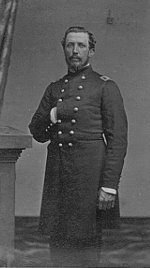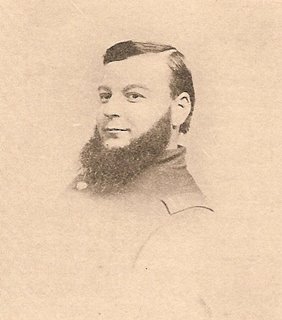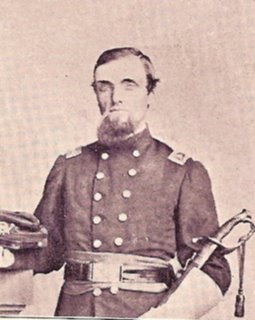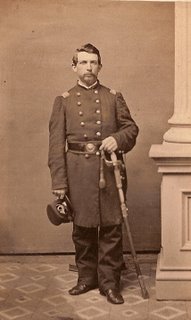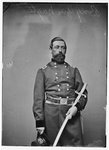
The following biographical sketch of James Nagle appeared in Memorial to the Patriotism of Schuylkill County, by Francis Wallace (Pottsville: Benjamin Bannan, 1865): Pages 501-504.
“General Nagle was born in Reading, Pa., on the 5th of April, 1822. Even when a youth his tastes were military. In 1842 he organized in Pottsville, where he resided, the Washington Artillery Company. When war was declared against Mexico, he, among the first, tendered the services of his Company. They were accepted. The Company left Pottsville, December 5, 1846, for Pittsburgh, Pa., and was mustered into the United States service as Company B, 1st Pennsylvania Regiment. The Regiment was among the first troops to land at Vera Cruz. The Company was one of the four that first approached the city within a few hundred yards under cover of darkness, to clear away the chapperal to enable a naval battery to be planted. Gen. Nagle was engaged during the entire siege, and rendered efficient service. At the Battle of Cerro Gordo he acted as Major with the Regiment to Perote Castle, where he was stationed with three other companies under command of the Colonel to keep communication between Vera Cruz and Puebla open, while the army under Gen. Scott, was advancing. June 20, 1847, he and his company were engaged at Lahoya in assisting Gen. Cadwallader through the Pass with reinforcements and large trains of stores and money. The Pass was strongly fortified by guerillas, but they were routed. October 9, 1847, he and his company were engaged at Huamantla; on the 12th at Puebla, and on the 19th at Atlixco. In each engagement the enemy was routed with heavy loss. Subsequently he advanced with his Regiment to the City of Mexico; remained there several weeks, and was finally stationed at San Angel until the close of the war. The company was mustered out of the service at Philadelphia, July 27, 1848, and reached Pottsville on the 28th, where it experienced an enthusiastic reception.
At a meeting of the citizens of Pottsville, the following among other resolutions, was adopted:
Resolved, That while we rejoice in the glorious termination of the late struggle with Mexico, we acknowledge the brave and gallant conduct of the officers and men composing the volunteers from Schuylkill County, under the command of Capt. James Nagle, who answered to the call of duty, regardless of the privations and sufferings incident to a long campaign in an enemy’s country, thousands of miles from their homes.
Soon after his return, he was presented with a handsome sword by the citizens of Schuylkill County, for his gallant services in Mexico. In the Autumn of 1852, he was elected Sheriff of the County, and subsequently to Brigade Inspector and Colonel. He kept up the organization of the Washington Artillerists, until the commencement of the Rebellion in 1861, when the Company, under the command of Capt. James Wren, was one of the first five companies to reach Washington for its defense.
Captain Nagle was commissioned Colonel of the Sixth Pennsylvania Regiment by Gov. Curtin, for three months. His Regiment served in the Brigade of Col. Geo. H. Thomas, Gen. Patterson’s Department. Col. Nagle was engaged with his Regiment in the skirmish at Falling Waters. He crossed the Potomac four times, and advanced beyond Martinsburg and Charleston, Va. At the termination of his term of service Col. Nagle was highly complimented by Gen. Patterson, and received a complimentary order (No. 16) from his Brigade Commander, Col. Thomas.
In a fortnight after his return from the three months’ service, Col. Nagle organized the 48th Pennsylvania Regiment for ‘three years or the war.’ He was commissioned Colonel of it by Gov. Curtin. He was ordered to Fortress Monroe, and shortly after his arrival there, was sent by Gen. Wool to Hatteras Island, after Gen. Williams had been relieved. He was in command of the post four months. After the capture of Roanoke Island, he, with a portion of his Regiment, accompanied Gen. Burnside’s fleet, and was present at the capture of Newbern, N.C. Immediately after the battle of Newbern, he was assigned by Major General Jesse L. Reno to the command of the 1st Brigade, 2nd Division, 9th Army Corps. The Corps soon joined Gen. Pope. Gen. Nagle was engaged with his Brigade in the Second Battle of Bull Run. In an assault upon the enemy, made in dense woods, where it was impossible to remain mounted, he led his Brigade on foot. His horse was captured after receiving eight wounds.
Soon after the battle Gen. Reno recommended him to the President for promotion to Brigadier-General. Gen Reno’s letter was as follows:
Headquarters, 9th Army Corps
Near Washington, Sept. 7th, 1862
To His Excellency, the President of the United States:
Sir:-I have the honor to recommend Col. James Nagle, 48th Regt. Pa. Vols., for promotion as Brigadier General. Col. Nagle has served with me with fidelity and ability as commander of a Brigade, since the Battle of Newbern, and in recent battles conducted himself with gallantry, and led his command with judgment and discretion.
I have the honor to be
Very Respectfully, Your obd’t servant,
J.L. Reno
Major-General com’dg
The appointment was made. Gen. Nagle was subsequently in the battles of Chantilly, South Mountain, and Antietam, where his Brigade did good service. During the last named engagement Gen. Nagle’s Brigade was the first to advance upon the enemy at the bridge over the Antietam, and, when it had expended all its ammunition, the 2nd Brigade of the same Division relieved it. Several more rounds were fired, when the enemy began to waver, and the bridge was stormed and carried by the 2nd Division, commanded by Gen. Sturgis. The loss was heavy, but the gallant assault saved the day, as appears from the following order:
Head-Quarters, 2nd Div. 9th A.C.
Antietam, September 20, 1862
General Order, No. 11
The General commanding the Division, avails himself of this lull in the roar of battle to return his thanks to the officers and troops, for their handsome behavior in the battles of South Mountain and Antietam Bridge, and to say to them that he has been assured by Gen. Burnside that Gen. McClellan considers the carrying of the bridge as having saved the day.
S.D. Sturgis
Brig. Gen., com’dg
An officer wrote from the battle-field that Nagle’s and Ferrero’s Brigades of Sturgis’s Division, occupied the ground and held the crest of the hill all that night, and drove the enemy from the field.
At Amissville in a skirmish, Gen. Nagle with his Brigade, drove the Rebels finely. They were also engaged at the First Battle of Fredericksburg. The Brigade fought bravely under its gallant commander, and sustained a heavy loss.
Subsequently the Ninth Corps was detached from the Army of the Potomac, and sent to Newport News to recruit. They remained there for several weeks, and were then sent to Lexington, Ky., where Gen. Nagle was in command of the post for a short time. He was then ordered to advance with his Brigade to Winchester to watch the movements of the enemy. From there he went to Richmond, Ky., Paint Lick and Lancaster, where in May, 1863, Gen. Nagle resigned on account of severe suffering from angina pectoris—a painful disease of the heart.
Upon tendering his resignation, Gen. Nagle received from Gen. Sturgis the following expression of regret:
Head-Quarters, 2nd Div., 9th Army Corps
Dear General:
I cannot better express the pain it gave me to forward your resignation, then by giving you a copy of my endorsement upon it, viz: ‘Respectfully forwarded and approved. But I must express my deep regret at the necessity for this forwarding it. By his intelligence, energy, zeal and courage, and quiet, unassuming deportment, withal, Gen. Nagle has endeared himself to this command, and will carry with him the love and respect not only of those gallant troops he had led so often to victory, but of all who have the good fortune to know him.’
S.D. Sturgis
Brig. Gen., com’dg
Gen. Nagle issued a farewell address to his troops, and amid their regrets and with their earnest wishes for the speedy recovery of his health, returned home.
After having been at home about a month, rest and absence from the excitement and exposure of the field, had a beneficial effect. His health became better, and when Gen. Lee commenced his invasion of Pennsylvania in June, 1863, Gen. Nagle organized the 39th Regt., Pa. Militia, for the ‘emergency,’ and was commissioned Colonel by Gov. Curtin. He was mustered into the service on the 4th of July, 1863, and proceeded to the front at once. On his arrival there, Gen. Couch immediately assigned him to the command of a Brigade, composed of six regiment and one battery, numbering some forty-eight hundred men. He was mustered out of the service, August 2, 1863.
When in 1864, a call was made for the Hundred Days’ Service, Gen. Nagle with characteristic promptness and energy, organized the 194th Penna. Regiment, of which he was commissioned Colonel by Gov. Curtin, July 21, 1864. He was ordered to Baltimore. On his arrival Gen. Wallace directed him to report to Gen. Lockwood, commander of the 3rd separate Brigade, who assigned Gen. Nagle to the command of all the troops at Mankin’s Woods—about 8000 men. He guarded some of the approached to the city until the expiration of his term of service, when he was relieved and returned with his Regiment to Harrisburg, and was mustered out, Nov. 5, 1864.
General Nagle’s services in the Rebellion will ever be remembered with gratitude by not only the people of Schuylkill County, but by the nation at large, who owe the preservation of their liberties to the self-sacrificing devotion of men like him.’









